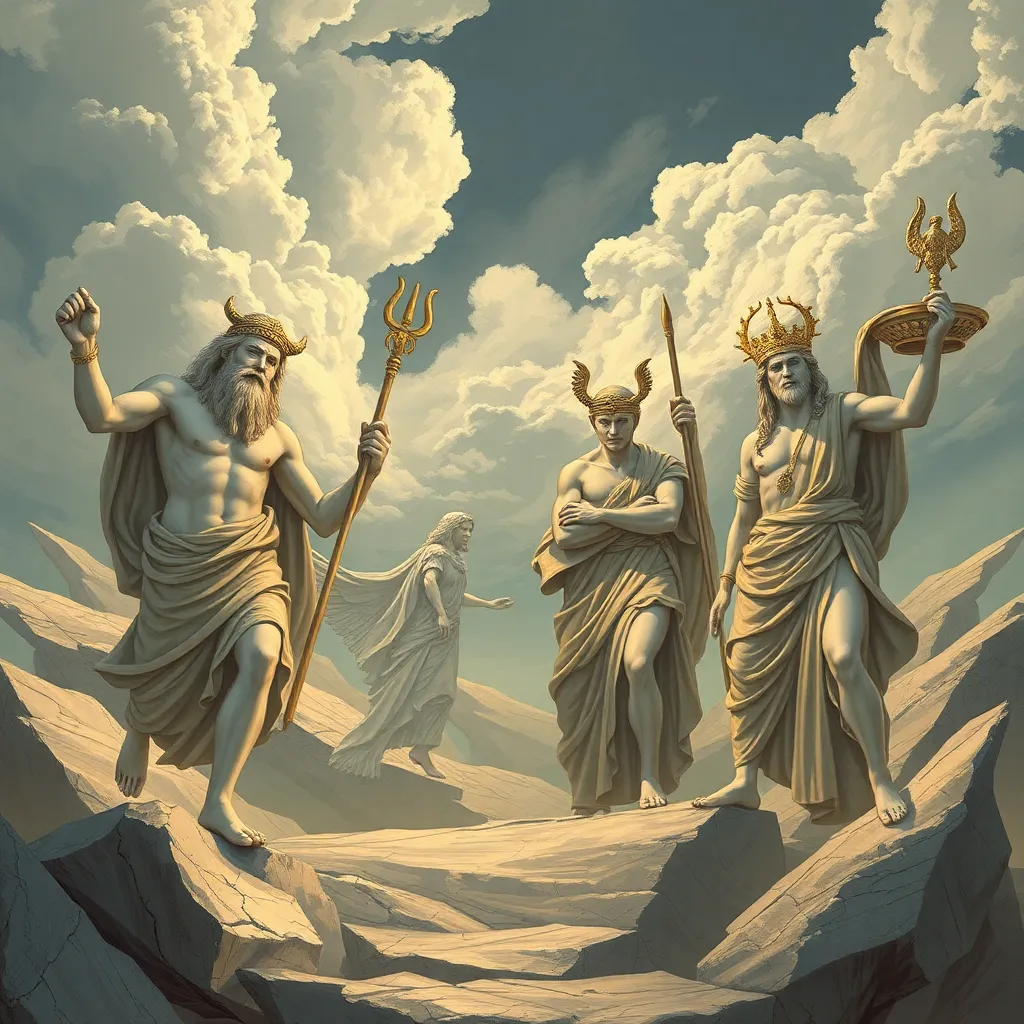The Olympians and Their Role in the Understanding of Morality
I. Introduction
The Olympians are a pantheon of deities in Greek mythology, residing atop Mount Olympus, the highest mountain in Greece. These gods and goddesses played a pivotal role in the ancient Greek worldview, influencing everything from natural phenomena to human behavior.
Mythology often serves as a mirror reflecting the moral values and ethical dilemmas faced by society. In ancient Greece, the stories of the Olympians conveyed complex moral lessons that helped shape the cultural understanding of right and wrong.
This article aims to explore how the myths surrounding the Olympians contribute to our understanding of morality, examining their historical context, character traits, conflicts, and their lasting impact on modern ethical discussions.
II. Historical Context of Olympian Myths
The origins of Greek mythology can be traced back to oral traditions, evolving over centuries into the rich tapestry of stories known today. The pantheon of Olympians consists of twelve principal gods, including Zeus, Hera, Poseidon, and Athena, each representing various aspects of the human experience.
The cultural significance of these deities in ancient Greek society was immense. They were not only objects of worship but also served as embodiments of ideals and moral standards. Festivals, rituals, and artistic expressions were often centered around these figures, reinforcing their importance in daily life.
Over time, the moral themes within these myths evolved, reflecting changing societal values. The stories of the Olympians became vehicles for exploring concepts such as justice, loyalty, and the consequences of hubris.
III. The Olympians as Moral Exemplars
Many Olympian figures possess distinct moral attributes that provide lessons for both gods and mortals. Below are key Olympians and the morals they represent:
1. Zeus: Authority and Justice
As the king of the gods, Zeus embodies authority, order, and justice. He is often depicted as a figure who enforces moral laws, punishing those who defy them and rewarding righteousness. His role as a protector of guests and upholder of oaths highlights the importance of justice and hospitality in Greek culture.
2. Athena: Wisdom and Warfare
Athena represents wisdom, courage, and strategic warfare. Unlike Ares, the god of chaotic war, Athena symbolizes the moral and ethical dimensions of conflict. Her guidance encourages thoughtful decision-making and highlights the value of intellect over brute force.
3. Apollo: Truth and Enlightenment
Apollo is associated with truth, prophecy, and enlightenment. He embodies the pursuit of knowledge and the importance of truthfulness, serving as a reminder of the ethical significance of honesty and clarity in human interactions.
Through their actions, these deities impart moral lessons, illustrating the virtues that ancient Greeks aspired to uphold.
IV. The Role of Conflict and Consequence
The myths of the Olympians are rife with conflict, both among the gods and between gods and mortals. These conflicts often serve as a vehicle for exploring moral dilemmas.
For example, the conflict between Zeus and Prometheus over the latter’s gift of fire to humanity raises questions about defiance and the consequences of challenging divine authority. Prometheus’s punishment serves as a cautionary tale about the limits of human ambition and the importance of adhering to moral boundaries.
Case studies of pivotal myths, such as the Trojan War, showcase moral dilemmas where loyalty, betrayal, and the quest for glory lead to tragic outcomes. The consequences faced by both gods and mortals in these narratives underscore the idea that actions have repercussions, reinforcing the moral framework of the culture.
V. Olympians and Human Morality
The characteristics of the Olympians often reflect human virtues and vices, creating a complex interplay between divine behavior and human ethics. For instance:
- Zeus’s infidelity illustrates human failings, while his role as a deity of justice highlights the ideal of moral rectitude.
- Athena’s wisdom serves as an aspirational model for human decision-making, encouraging individuals to seek knowledge and understanding.
- Apollo’s commitment to truth emphasizes the value of honesty in human relationships.
The impact of these myths on the moral framework of ancient Greek society was profound, shaping cultural norms and influencing the ethical considerations of individuals and the community.
VI. The Influence of Olympian Myths on Modern Morality
The stories of the Olympians remain relevant in contemporary ethical discussions. They continue to inspire literature, art, and philosophy, serving as a source of reflection on moral issues.
Examples of modern interpretations include:
- Literary adaptations that reimagine the conflicts and moral lessons of the Olympians.
- Artistic representations that draw on themes of justice, wisdom, and consequence.
- Philosophical debates that utilize mythological narratives to explore ethical principles.
The ongoing legacy of the Olympians highlights their enduring significance in shaping moral principles and ethical considerations in today’s society.
VII. Critiques and Counterarguments
While the Olympians provide valuable moral lessons, there are limitations to using them as moral guides. Critics argue that:
- Many Olympian actions are morally ambiguous or contradictory, making them unreliable exemplars of virtue.
- Different philosophical traditions, such as utilitarianism and deontology, offer alternative frameworks for understanding morality that do not rely on mythological narratives.
- Modern ethical dilemmas may require more nuanced approaches than those found in ancient myths.
These perspectives encourage a broader discussion about morality that encompasses various sources of understanding beyond mythology.
VIII. Conclusion
In summary, the Olympians serve as complex figures that illuminate the moral landscape of ancient Greece. Their stories offer insights into authority, justice, wisdom, and the consequences of human actions.
The enduring significance of these myths in moral philosophy reflects their capacity to engage with contemporary ethical issues, inviting ongoing exploration and reinterpretation.
As we navigate the complexities of modern morality, the lessons of the Olympians remind us of the timeless nature of ethical inquiry and the importance of understanding our moral frameworks through the lens of myth.




